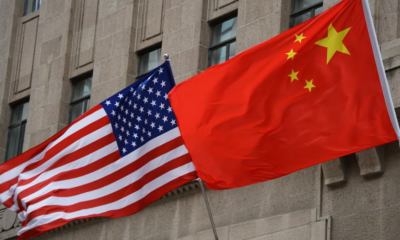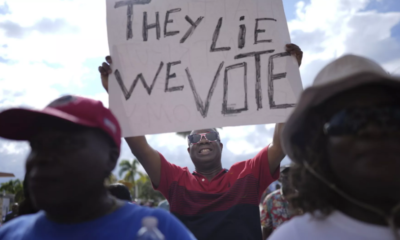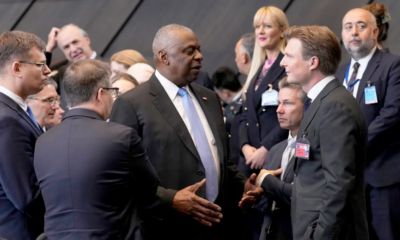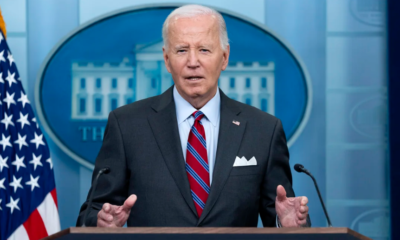Politics
Chinese Hackers Infiltrate Major U.S. Telecom Firms in Possible National Security Breach
A sophisticated group of Chinese government-linked hackers has infiltrated several major U.S. telecommunications companies in recent months, potentially compromising sensitive information related to national security, according to multiple sources briefed on the matter. The hack has raised significant concerns among U.S. officials, who are investigating the extent of the breach.
Investigators believe the hackers may have accessed wiretap warrant requests, which are typically used by law enforcement in criminal and national security investigations. The targeted companies include AT&T, Verizon, and Lumen, sources revealed. However, the full scope of the data the hackers may have obtained is still under investigation.
The hack comes at a time of heightened tensions between Washington and Beijing over cyber-espionage and other national security issues. U.S. telecom firms play a critical role in internet and phone communications, making them prime targets for hackers seeking valuable data. These firms maintain large volumes of caller and user data, which is often subject to law enforcement access through warrants.
Some of the investigations affected by this breach could be of particular interest to China, as the U.S. has pursued legal actions against Chinese government agents for allegedly targeting Chinese nationals and political dissidents in the U.S., as well as American companies.
While AT&T and Lumen declined to comment, Verizon did not respond to multiple inquiries. The Department of Justice and the FBI also declined to provide statements on the matter. The Chinese Embassy in Washington, DC, denied the accusations, dismissing the hacking reports as a “distortion of the fact” and accusing the U.S. of politicizing cybersecurity issues to smear China.
The Wall Street Journal first reported the hacking activity, which has since been discussed in classified briefings with the House and Senate intelligence committees. Microsoft and Mandiant, a cybersecurity firm owned by Google, are assisting with the investigation.
The hackers, identified by the cybersecurity industry as Salt Typhoon, are known for their persistence and skill. Microsoft acknowledged tracking the group and noted that it provides customers with information about potential state-sponsored cyber activity.
Salt Typhoon is just one of many Chinese hacking teams, U.S. officials said, highlighting the vast cyber capabilities at China’s disposal. FBI Director Christopher Wray has previously stated that Chinese government-backed hackers outnumber FBI cyber personnel 50 to 1. Another hacking group, also linked to Beijing, has allegedly infiltrated U.S. transportation and communication networks, potentially to disrupt any U.S. response to a Chinese invasion of Taiwan.
As cybersecurity tensions continue, hacking incidents remain a frequent point of contention in U.S.-China relations.
Politics
Chinese Students Shun U.S. Education as Concerns Mount Over Safety, Policies
The longstanding trend of Chinese students pursuing higher education in the United States is shifting as new statistics reveal a decline in their numbers, driven by safety concerns, changing perceptions of the American Dream, and more competitive options abroad.
For the first time since 2009, students from India have overtaken their Chinese counterparts as the largest group of international students in U.S. higher education. According to data released by the U.S. State Department and the Institute of International Education, Indian students accounted for 29% of international students in the 2022-2023 academic year, compared to China’s 25%.
Factors Behind the Decline
Experts attribute the drop in Chinese enrollment to a combination of geopolitical tensions, visa restrictions, and rising concerns about racism and safety in the U.S. These issues have been exacerbated by the COVID-19 pandemic, which saw a surge in anti-Asian hate crimes.
“Chinese students and families have become increasingly disillusioned with the American Dream,” said Mallie Prytherch, a researcher at the University of Hong Kong. “The onslaught of racism during Donald Trump’s presidency and the pandemic caused many to reconsider their options.”
The decline is also linked to U.S. policies. Visa restrictions, particularly for Chinese graduate students in science, technology, engineering, and mathematics (STEM) fields, have made studying in the U.S. more challenging. In 2020, over 1,000 Chinese students had their visas revoked due to national security concerns.
Even under President Joe Biden, many Trump-era policies have remained in place, discouraging Chinese students from pursuing U.S. education.
A Changing Global Landscape
Simultaneously, the global education market has evolved. Countries like Canada, the UK, and Australia have introduced immigration-friendly policies, making them attractive alternatives. Chinese universities, too, are gaining prestige, with many professors returning from the U.S. to teach at home.
“The quality of education in China has improved significantly,” Prytherch noted. “Students no longer feel that an American degree guarantees a competitive edge unless it’s from an Ivy League institution.”
Parents and students are also drawn to the perceived safety and stability of staying within China, particularly as the U.S. grapples with issues like gun violence and political polarization.
A Broader Shift in Priorities
The decline in Chinese students has implications for U.S. universities, which have long relied on tuition from international students. Despite this, some officials continue to promote the U.S. as a welcoming destination.
“We value Chinese students and want to ensure they feel welcome,” said Marianne Craven of the State Department.
However, for many Chinese families, the allure of the U.S. has dimmed. “China is not too bad anymore,” said one student Prytherch interviewed. “At least it’s safe.”
Politics
Misinformation and Foreign Interference Challenge U.S. Election Security, Experts Warn
While the recent U.S. presidential election was largely smooth, with high voter turnout and minimal disruptions, experts are raising alarms over growing foreign interference and the rise of misinformation aimed at undermining public trust in the electoral system. This trend is expected to escalate in the coming years, experts say.
In the months leading up to the election, Russia, China, and Iran increased their use of English-language disinformation campaigns targeting American voters. Federal officials warned that these adversaries sought to exploit social media platforms and fake websites to sow doubts about election integrity and stir political chaos. Notably, Russia was active in spreading staged videos intended to damage the reputations of Vice President Kamala Harris and her running mate, Minnesota Governor Tim Walz. The Kremlin also paid a Tennessee media company nearly nine million euros to produce pro-Russian content.
“Russia clearly interfered in this election,” said Brian Taylor, a political science professor at Syracuse University. “Their goal was to create division and chaos, though there is no evidence that their activities altered the election outcome.”
Experts argue that foreign adversaries, especially Russia, are playing a long game. Their aim is not only to influence elections but also to undermine American democracy and weaken the U.S. over time. “What Russia is trying to do is steer the United States in a particular direction, regardless of who wins the election,” said Emerson Brooking, a senior fellow at the Atlantic Council’s Digital Forensic Research Lab.
Both Russia and China have denied involvement in U.S. election meddling. Nevertheless, federal agencies, including the FBI, acted swiftly to identify and debunk false claims, such as a viral video alleging voter fraud in Georgia. Steve Simon, president of the National Association of Secretaries of State, praised the federal response, highlighting the importance of quick action to limit the spread of disinformation.
Despite these efforts, the problem of foreign interference persists. Kim Wyman, former head of the U.S. Cybersecurity and Infrastructure Security Agency, warned that such attempts would continue in future elections. “This election demonstrated that foreign adversaries are still trying to influence U.S. elections,” she said.
On Election Day itself, the most significant challenge came in the form of bomb threats reported in five battleground states, which briefly disrupted some polling places. Despite this, the election proceeded largely as expected, with high turnout and relatively few technical issues. The widespread use of early voting, which saw over 84 million ballots cast, helped alleviate pressure on Election Day and ensured election workers had time to handle unexpected challenges.
David Becker, head of the Center for Election Innovation and Research, praised early voting efforts, noting that it helped mitigate some of the threats that emerged. Election officials across the country were also well-prepared for emergencies, with extensive training and coordination with law enforcement in the months leading up to Election Day.
“The system held up well under pressure,” said Carolina Lopez, a former election official. “Professionals knew exactly what to do when the unexpected happened.”
Politics
FBI Warns Trump Attorney of Phone Hack by Chinese Spies Amid Expansive Cyber Operation Targeting U.S. Officials
-

 Business1 year ago
Business1 year agoSaudi Arabia’s Model for Sustainable Aviation Practices
-

 Business1 year ago
Business1 year agoRecent Developments in Small Business Taxes
-

 Politics1 year ago
Politics1 year agoWho was Ebrahim Raisi and his status in Iranian Politics?
-

 Business11 months ago
Business11 months agoCarrectly: Revolutionizing Car Care in Chicago
-

 Business11 months ago
Business11 months agoSaudi Arabia: Foreign Direct Investment Rises by 5.6% in Q1
-

 Technology1 year ago
Technology1 year agoComparing Apple Vision Pro and Meta Quest 3
-

 Politics1 year ago
Politics1 year agoIndonesia and Malaysia Call for Israel’s Compliance with ICJ Ruling on Gaza Offensive
-

 Sports10 months ago
Sports10 months agoKeely Hodgkinson Wins Britain’s First Athletics Gold at Paris Olympics in 800m






























